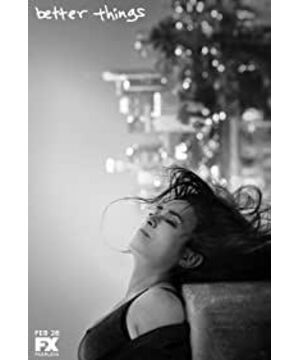It was in the shower on Thursday night that I suddenly realized what was so wonderful about this show: the ubiquitous contradictions. Sam's carelessness and thoughtfulness, boldness and delicacy, love and hate for daughters, mothers and life; the rebellious and cowardly of the eldest daughter Max; the second daughter Frankie keeps emphasizing her feminism and always wants to be a boy, When I encounter a problem, I want my father who has long since divorced to come forward to solve it; the youngest daughter Duke seems to be so sweet, but in fact, she is a little adult who does not care too much about others and dares to say "shit"; my mother Phil does not want to The burden of being a daughter and I can't help but want to be close to her... The trademark "middle-aged mourning comedy" style: life is so bad. I'm not going to be hysterical because I know it's useless; I'm not going to be hysterical because I'm this age. So, so be it. The first episode opens with Sam wearily sitting on a mall bench, head down and playing with his phone. The little girl beside her cried heart-breakingly. The old lady on the other side of the bench cast a judge's glance at Sam. "Hi, do you want to buy her a pair of earrings? She wants those $6 earrings. She already has them at home, but she wants them now. You either buy her or get stared at me." Sam said without expression. One of the most impressive and heartbreaking mother-daughter confrontations was when the eldest daughter kept swearing at Sam: "Mom, I hate you. I want you to live in hell." And Sam said calmly, "You say Too many times. You say it doesn't work for me anymore. You have to come up with something tougher." A series of mourning treatments builds up Sam's character and creates a unique comedic effect. The audience can't simply judge whether Sam is a good mother or a bad mother. She would steal the condom left by the eldest daughter's bedside table in order to have an affair with a married man at home, and would turn a blind eye to the complaints of the second daughter who expressed her desire for attention; but she also held her eldest daughter in her arms when she was in love, I was overjoyed to learn that the job I finally got was cancelled, just because I could have time to go to my second daughter's school activities. Life is great, even at its worst. They all say "one show for three women", but what about "three daughters"? None of the three daughters in the play is worry-free: the eldest daughter Max is in puberty, falling in love and playing rebellion, which makes people worry; the second daughter, Frankie, breaks into the men's toilet, keeps her hair short, and keeps her mouth open and shut is equal to women's rights; The youngest daughter Duke seems to be well-behaved and clingy, but she has long been swearing while carrying her mother. Not to mention the hoarding, bizarre British mother who lives opposite the door. The life of the heroine Sam can be said to be the scene of a nuclear explosion every day. We can find that behind the three "bad" daughters, there is a "bad" mother Sam. Sam's mourning was when he was sitting on the stairs thinking about the unfortunate days, but the thoughts on his mind were "Have you bought your daughter's stationery bag?" and "What are you going to cook for dinner?" This is the mourning of the middle-aged, it is Louis CK A classic mourning. Unlike young people who will blow up when they encounter hard times, middle-aged people tend to live their lives without hysteria and enthusiasm. Such trivialities and undercurrents of calmness make people deeply appreciate the reality of life. Sam really wasn't a good mother or a good daughter. At home and at work, she was always busy and restless. The most common in the film is the confrontation between her and the eldest daughter. The mutual scolding between the two is almost interspersed with the whole plot; she carries the child and has a date with a married man, and even secretly takes the condom in the eldest daughter's room; Apostate and masculine, she always deceives herself that "she's just a child"; she can't get along with her mother calmly, and cancels her birthday trip with her because of a breakdown, but we have to admit that the heroine Sam loves herself deeply family. She would accompany her younger daughter to sleep after an exhausting day; she would hug her eldest daughter when she was in love; she would panic and cry when her mother pretended to faint. The most touching thing is that when the eldest daughter was bewildered by the pressure of further education, Sam took her to the clothing store to try on a suit. We were amazed to see a coy and tender mood in this rebellious teenage girl as the eldest daughter smiled at her mother in the mirror. Sam may have done a lot of wrongs growing up as a child, but she was never absent, and she worked hard at everything. The names of the heroine and three daughters (Sam, Max, Frankie and Duke) in the film are very neutral. But compared to the heroine who is self-improving in everything, her three daughters, including the second daughter who shouts for equality of women's rights every day, seem a little cowardly. They would yell, "Let Daddy handle it!" when the fire alarm went off, but the man even wanted to hide his move to the neighborhood because he didn't want to spend more time with them over the summer. I believe we can all find a new interpretation of family love. Family affection is the hug after falling in love with each other, the understanding after the collapse, the support in the difficult situation, and the mutual growth of both parents and children.
View more about Better Things reviews











